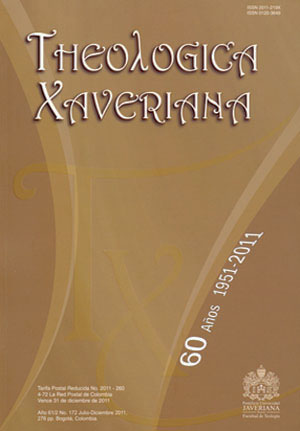Abstract
This article explores the potential of the narrative exegesis applied to the dramatic sequence presented in Jn 1:19-2, 12. It proposes that, on the one hand, the value of such hermeneutical methodology for biblical analysis provides a particular dialogical dynamics in which the reader/listener –involved in the storyline– becomes a participant in the story updating it and compromising himself/herself to incorporate it into his/her own everyday life and his/her own social environment. On the other hand, this account, when analyzed, allows us to discern the paradigmatic process of faith proposed from the Johannine community; it starts with the testimonial proclamation and finishes with the act of believing by the disciples through the sign, and in the process it covers the personal encounter and the affiliation to Christ.
This journal is registered under a Creative Commons Attribution 4.0 International Public License. Thus, this work may be reproduced, distributed, and publicly shared in digital format, as long as the names of the authors and Pontificia Universidad Javeriana are acknowledged. Others are allowed to quote, adapt, transform, auto-archive, republish, and create based on this material, for any purpose (even commercial ones), provided the authorship is duly acknowledged, a link to the original work is provided, and it is specified if changes have been made. Pontificia Universidad Javeriana does not hold the rights of published works and the authors are solely responsible for the contents of their works; they keep the moral, intellectual, privacy, and publicity rights.
Approving the intervention of the work (review, copy-editing, translation, layout) and the following outreach, are granted through an use license and not through an assignment of rights. This means the journal and Pontificia Universidad Javeriana cannot be held responsible for any ethical malpractice by the authors. As a consequence of the protection granted by the use license, the journal is not required to publish recantations or modify information already published, unless the errata stems from the editorial management process. Publishing contents in this journal does not generate royalties for contributors.


